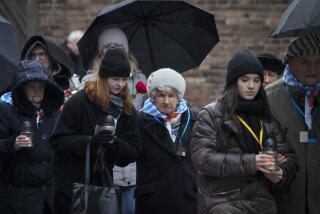USC-based project aims to keep memory of Nanjing massacre alive
reporting from NANJING, China — Nearly 80 years later, Liu Suzhen could still recall her ordeal. And when she did, her ruddy cheeks burned. She shielded her face with chapped, swollen fingers as though Japanese bombers were zooming down as she spoke.
“My neighborhood was among the last to fall. When the sirens sounded, my aunt and I’d run and duck inside the bunker,” said Liu, now 84, leaning on her dragon-head walking stick. “This is the history that my granddaughter has been passing on to her son.”
Liu is determined that people other than her descendants know the history of the Nanjing massacre, the bloodiest episode in the Chinese theater during World War II. After neatly printing her name, the widow consigned her memories of how she survived the siege to the archive of the Shoah Institute for Visual History and Education at the University of Southern California.
“This is probably the last time we can interview the survivors directly,” said Karen Jungblut, the foundation’s director of research and documentation, who tried to connect with and console Liu across the language barrier. “The least we can do is let them know the world is interested in them.”
Established in 1994 by director Steven Spielberg to record survivors of the Holocaust (called the Shoah in Hebrew), the foundation has since branched out to delve into more recent genocides, in Cambodia and Rwanda.
In China, the task of documentation is made all the more challenging by the time lapse — nearly 80 years, during which the massacre came to be called the “forgotten” holocaust. The two-month rampage by Japanese soldiers in 1937-38 was also known as the Rape of Nanking.
China puts the death toll at 300,000; some Japanese historians claim much lower figures.
Beginning in late 2012, the foundation and the Nanjing Massacre Memorial Hall joined forces to track down survivors and videotape their recollections. So far, recorded, Chinese-language interviews with about 30 survivors have been included in the foundation’s video archive.
Join the conversation on Facebook >>
Only 200 survivors are believed to be alive, most in their late 80s. Liu lost her husband, a fellow survivor, a few years ago. The oldest survivor interviewed is 94. Last month, the foundation recorded 20 more, including Liu, and still hopes to hear from an additional 50 survivors.
This race against oblivion comes on the heels of a recent revival of commemorations for Nanjing.
In December 2014, China’s parliament instituted the country’s first memorial day — not just for the victims of Nanjing but for all those who perished during the Japanese invasion, which was marked by the 1932 founding of the puppet state of Manchukuo in northeastern China. And last November, China applied successfully to inscribe the massacre in UNESCO’s Memory of the World register. A few weeks later, a 70-volume compilation of Nanjing archives was produced inside the warren of research offices down the hall from where the oral history of Liu and others were recorded.
All this stands in sharp contrast to four decades of official silence — largely borne out of diplomatic expediency and geopolitical calculations, according to many historians who are versed in Communist China and its diplomacy.
“China wants to have moral authority over Japan and can use something that can be called the ‘history card,’” said Yang Daqing, associate professor of history and international affairs at George Washington University.
To the extent that the smothering and rekindling of memories over Nanjing were mostly the Chinese state’s doing, ideological forces in Japan — which included both revisionist denial and remorseful soul-searching — only served to complicate the politics of commemoration.
Shortly after the war, China hosted two war tribunals — in Nanjing and in Shenyang in the northeast. But the country was too embroiled in political movements to settle scores with former foes.
In 1972, Japan recognized the People’s Republic as the one and only China, and China’s premier agreed to relinquish all war claims.
During that time, historical research on the massacre was banned from public circulation, said Yang. And when a Chinese justice who had been at the 1946 Tokyo war tribunal later called on historians to study the massacre, he was accused of inciting hatred against the Japanese.
China’s about-face came in the 1980s. Attempts in Japan to revise textbooks to downplay the Nanjing atrocities and visits by Japanese politicians to the Yasukuni shrine, which memorializes some war criminals, stoked public resentment in China.
Around the same time, a mass grave from the massacre was discovered in Nanjing, on the site of the present-day memorial hall. Excavation of the remains of several hundred corpses culminated, in 1983, in the first public commemoration — 45 years after the fact.
And after the Tiananmen massacre in Beijing in 1989, when a student pro-democracy movement was brutally crushed, the Chinese leadership exploited a sense of nationalism to mend its legitimacy. Japan, the invader turned investor, became a handy target. In 1998, on the first visit to Tokyo by a Chinese head of state, Jiang Zemin demanded, but failed to receive, a written apology for the wartime atrocities from his Japanese counterpart.
Meanwhile in Nanjing, the memorial hall opened in 1995, and the mass grave, a tomb-like enclosure displaying full skeletons of the slaughtered, was made a permanent exhibit by 2007. Surrounded by reflecting pools and a peace park with pines planted by Japanese pacifists, the site is both meditative and funereal.
However, in early December, a new, more tendentious wing celebrating China’s “victory in the anti-fascist war and the trials of Japanese war criminals” was unveiled. Marking the new addition are banners festooning lampposts that read: “Forget not the nation’s shame. Fulfill the China Dream.”
“Unfortunately, there are many people fighting over the memories,” said Takashi Yoshida, a historian at Western Michigan University who wrote a doctoral thesis tracking the responses to the massacre over the decades. He harbors no illusion about Nanjing entering the annals of settled history.
“The dispute over Nanjing will continue,” he said. “There will be no end.”
Law is a special correspondent.
ALSO
India seeks to shut down surrogacy services for foreign would-be parents
In Jordan, Sudanese live in fear of deportation
Despite theologians’ disapproval, more Iranians are discovering the joy of pets
More to Read
Sign up for Essential California
The most important California stories and recommendations in your inbox every morning.
You may occasionally receive promotional content from the Los Angeles Times.










